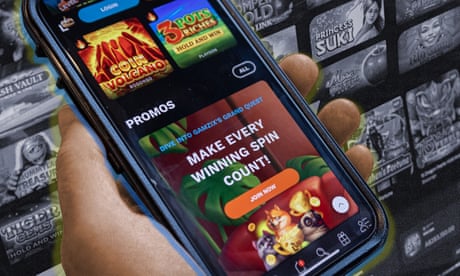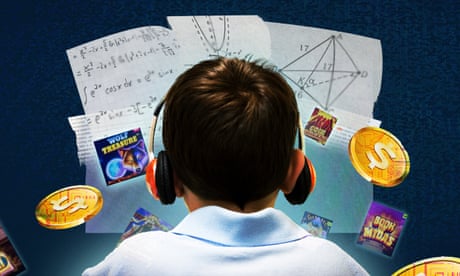Extract from The Guardian
Wendy’s son, 22, stole from his girlfriend to fund his gambling. The addiction cost him his relationship – and his parents tens of thousands of dollars.
Sun 22 Oct 2023 06.00 AEDT
Last modified on Sun 22 Oct 2023 06.36 AEDTHer son’s girlfriend burst into tears. “She said, ‘I never … thought he would steal from me.’”
Wendy’s 22-year-old son had started gambling just before he turned 18, when he was working as a landscape apprentice with a boss heavily into gambling.
His girlfriend has now left him, and Wendy estimates she and her husband have spent up to $25,000 paying off his gambling debts.
A Guardian Australia investigation into the youth gambling crisis revealed a 16% increase in the number of young people seeking help for gambling in the past financial year, many of them entering adulthood with debt, broken relationships and depression.
It led MPs to call for an urgent parliamentary inquiry into the impact of advertising by harmful industries, including gambling, on children and young people, and also prompted many parents, including Wendy, to share their stories.
Wendy says she and her husband tried to stop their son from gambling, but he would turn to his friends for money instead, and they would charge him interest.
Wendy says her son has acquired more gambling debt by using money lending apps.
She and her husband are now dipping into their savings to pay $55,000 to send him to live-in rehabilitation for one month. “It’s got really, really bad.”
“I’m just so fortunate that I’m in a position to be able to do this,” Wendy says. “But there’s so many other parents out there that just aren’t and that makes me so sad. The government needs to stop the gambling advertising on the television, stop shoving it down these kids’ faces.”
Just like tobacco
Dr Simone McCarthy and her colleagues from Deakin University’s faculty of health have just finished interviewing 500 parents across Australia about their concerns about risky products their children are engaging with, including gambling. Each of the parents has a child aged between 11 and 17.
“Parents are concerned, particularly around how children see gambling as a way to make money, and that comes back to the way that the ads are presenting gambling as a fun, social and easy way to make money,” McCarthy says.
McCarthy and other public health experts say that, particularly in the online space, celebrity endorsements, influencer endorsements and “risk-reducing” promotions such as cash-back offers are having the most impact on young people, by prompting them to think that gambling has little or no risk attached to it.
“Parents told us it is hard to … counter all the positive messages their children get [about] gambling, from such a powerful industry,” McCarthy says. “They think it’s the gambling industry as well as the government who holds the most responsibility and ability to implement change.”
Along with comprehensive gambling advertising bans, including on team sports uniforms, experts say governments must tackle the way the gambling industry seeks to influence public opinion and policy. Like the tobacco industry, this includes political donations, corporate social responsibility strategies and lobbying.
The independent MP Zoe Daniel has been advocating for publication of all ministerial diaries in real time so voters can see the industry representatives and lobby groups their elected representatives are meeting with.
Guardian Australia asked the offices of the federal health minister, Mark Butler, the communications minister, Michelle Rowland, and the social services minister, Amanda Rishworth to provide details on the number and nature of meetings they have held with gambling industry representatives, including gambling companies, broadcasters, other media organisations and sporting codes.
None of the ministers’ offices would provide the information.
“To refuse to do so sits uncomfortably with the prime minister’s post-election promise to ‘change the way’ we do politics,” Daniel says. “If it’s good enough for state governments in NSW, Queensland and Tasmania to publish minister’s diaries so should the Albanese government.
“We do know that gambling outfits, media companies and sports organisations have ready access to ministers … this is not the case for advocates for a ban on the scourge of gambling advertising.”
It appears to be the new normal. They are unable to stop themselves from checking their devices in class
Betting at school
High school teacher Georgia* says online gambling games have become the “new normal” among her students.
“I have witnessed high school students in grades as young as Year 7 play games that are designed like gambling machines,” she says. “I have seen older students in the last four years gamble on horse racing ‘games’ and then from there, witnessed Year 12 students placing proper bets during class time and some of them monitoring their cryptocurrency in class.
“It appears to be a new normal. They are unable to stop themselves from checking their devices in class because of this. It is incredibly concerning.”
Melanie*, who has been teaching for 12 years, says before the Covid-19 pandemic she had never known a student to bet on sports for money. But it has become a relatively new pastime of her students and she believes their high exposure to gambling ads and apps online is partly to blame.
“My year 12 class, who’ve recently finished, were super addicted to gambling apps on their phones,” she says.
She describes her students as “pretty well-rounded students”.
“They’re academic, they play sports, they’re not just sitting at home on a computer all the time. But then somehow, I think, because they were at home [during Covid-19], not able to do those things for a long time, somehow they got hooked on to this gambling stuff”.
They aren’t gambling in class because it is a no-phones school but Melanie says they talk about gambling openly, including about how much money they have lost and won.
“There are also many students who go to the pokies once they turn 18 as a thing to do on a weekend night,” she says. “Many younger students are highly addicted to video games that give you tokens or coins … they are not gambling but the likeness of these games to gambling is hard to deny.”
*Names changed
Are you a parent or teacher concerned about youth gambling? Tell us your experience
Gamblers Help: 1800 858 858. Other crisis support services can be reached 24 hours a day: Lifeline 13 11 14; Suicide Call Back Service 1300 659 467; Kids Helpline 1800 55 1800; MensLine Australia 1300 78 99 78; Beyond Blue 1300 22 4636


No comments:
Post a Comment